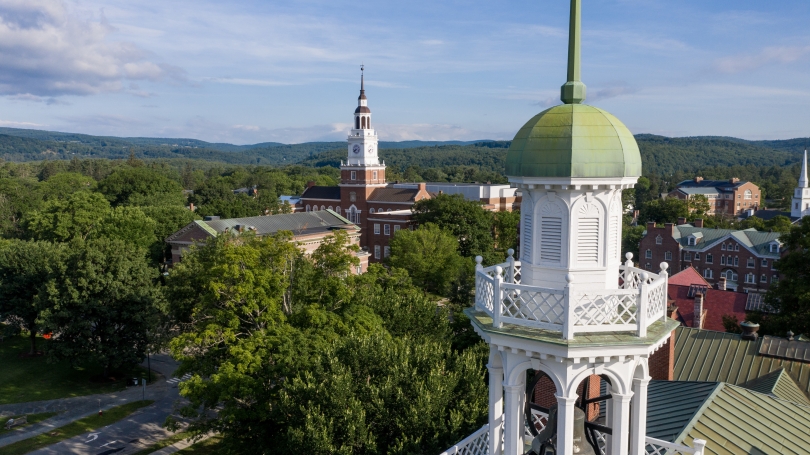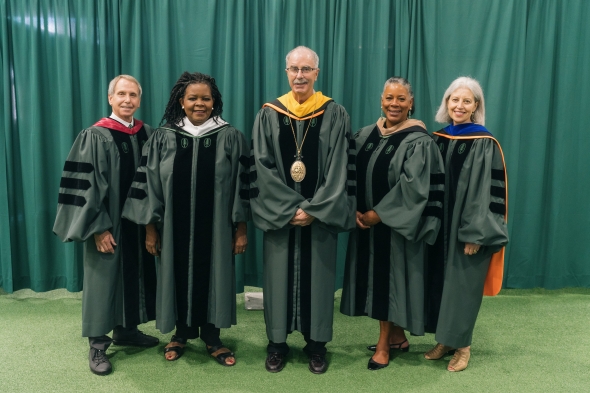

The board of trustees also paid tribute to three members who are retiring.
At their June meeting, members of the Dartmouth Board of Trustees met with senior leaders from across the institution to strategize on the most effective way to expedite a complete re-opening of campus and to prioritize student-faculty in-person interaction. After an extraordinary academic year shaped by the global COVID-19 pandemic, which brought increased mental health concerns, board members advocated for a return to normal campus operation as early as possible during the summer term.
"This has been an unprecedented and complicated year for higher education," said President Philip J. Hanlon '77. "In March of last year we were forced to transition to remote learning overnight, and now with the advent of multiple highly effective vaccines, we are contemplating a reopening that is nearly as sudden. While welcome news, it is complicated and requires the entire community coming together to make it happen safely, smoothly, and successfully. We can do this."
Provost Joseph Helble discussed the transition plan for Dartmouth that will continue to loosen COVID-19 restrictions by July 1.
"With the rate of vaccinations rising more quickly than expected and continued partnership with the town of Hanover on a safe and steady relaxation of COVID precautions, we look forward to increasing the pace at which we open up the campus," Helble said. "Summer term promises to quickly consolidate the gains we achieved in the spring as we head toward an open and fully operational campus in the fall. Plans are well underway to welcome the Class of 2025 and to find creative ways to provide returning undergraduate and graduate students with the Dartmouth experiences that attracted them to Hanover in the first place."
Despite the challenges of the past year, President Hanlon said, the year was also marked by progress and success.
"Members of the faculty were recognized for exceptional achievement in scholarship, teaching, and mentoring, including three Guggenheim Fellowships from the Faculty of Arts and Sciences and a member of the Geisel faculty was elected to the National Academy of Medicine. Our students continued to shine, achieving new milestones and winning awards for their performance and research, including for Best Technical Paper at NASA's Big Idea Challenge. This is the momentum that will propel us into a fresh and exciting academic year," Hanlon said.
A Magnet for Excellence
Trustees heard updates on the successful campus-wide admissions cycle for the 2021-2022 academic year, with presentations from Lee Coffin, vice provost for enrollment and dean of admissions and financial aid; Duane Compton, dean of the Geisel School of Medicine; Alexis Abramson, dean of Thayer Engineering; Jon Kull, dean of the Guarini School of Graduate and Advanced Studies; and Helble on behalf of the Tuck School of Business. Application rates have increased across the institution and the number of highly qualified applicants—including record numbers of first-generation students, low-income students, and students of color—has soared.
"As we look to the future, our incoming student body has never been more academically talented," said Hanlon. "Our admitted classes—from the undergraduate level to the PhD students—reflect the diversity of a truly global community and I am confident that the next generation of Dartmouth graduates will continue a legacy of leadership and excellence."
Prioritizing Mental Health
Trustees engaged in an extended discussion of the increasing mental health needs in higher education and what that means for Dartmouth after a year marked by tragedy.
"While the public health pandemic is subsiding in this country, the mental health pandemic continues to affect our community," said board Chair Laurel Richie '81. "Addressing this crisis is a critical component of promoting the academic success of our students and their ability to thrive at Dartmouth and after graduation. This will remain a high priority for the board until significant progress is made and we can credibly call Dartmouth a leader in promoting the mental health of our students."
Presenting on Dartmouth's strategy to improve the mental health of the student community were Kathryn Lively, dean of the College; Mark Reed, a physician and director of the Dartmouth College Health Service; Heather Earle, director of counseling at the health service; and Nance Roy, chief clinical officer at the JED Foundation, a nonprofit that works to protect emotional health and promote suicide prevention for teens and young adults. Dartmouth will participate in the foundation's signature JED Campus Program and, this coming fall.
"The growing national mental health crisis was of great concern among university and college leaders prior to the onset of the pandemic," said Lively. "As Dartmouth research shows, the isolation required to prevent the transmission of the coronavirus has exacerbated anxiety and depression for students and others. In the coming year, we will continue to be focused on students' experiences, strengthening their community, and helping to build their connections to each other as well as to faculty and staff, to alumni, and to Dartmouth."
Moving Infrastructure Projects Forward
The board approved the expenditure of $2.89 million to advance designs for energy infrastructure projects and $1.65 million to support campus housing renewal design development. Board members also voted to allocate $6.9 million for information technology infrastructure work.
Commencement Weekend Activities
Board members paid tribute to retiring trustees Emily Bakemeier '82, Mitchell Kurz '73, and Richie, who ends her tenure as board chair on June 30 after serving for four years in the role.

"We are grateful to these three distinguished leaders for giving so much of their time and talent in service to Dartmouth," said Hanlon. "Their commitment and stewardship reflect their unwavering dedication to our current and future students, faculty, and staff. We are particularly grateful to Laurel for her wisdom and leadership as chair of the board."
The three trustees participated in Sunday's commencement celebration on Memorial Field. Hanlon and Lempres attended a virtual luncheon with members of the Class of 1971, who celebrated their 50th reunion this weekend.
Approximately 2,000 guests joined the graduates on Memorial Field—and another 1,000 watched online—as Dartmouth awarded a total of 2,005 degrees—1,170 to undergraduates and 836 advanced degrees to graduates from Geisel, Thayer, Tuck, and Guarini.
The board reviewed and approved appointments and promotions to faculty in arts and sciences, and at Geisel and Thayer.
Pulitzer Prize-winning historian and MacArthur Fellow Annette Gordon-Reed '81, an emerita trustee, delivered the commencement address. Honorary degrees were awarded at an online ceremony on May 19 to Roger W. Ferguson Jr., an attorney and economist who served as president and CEO of TIAA, and as vice chairman of the board of governors of the U.S. Federal Reserve System; Louise Glück, a poet and 2020 Nobel Prize winner; Sal Khan, founder and CEO of the nonprofit Khan Academy; N. Scott Momaday, an artist, poet and 1969 Pulitzer-Prize winning novelist; Ernest J. Moniz, a nuclear physicist who served as U.S. Secretary of Energy; and Moses Pendleton '71, the choreographer who co-founded the dance companies Pilobolus and MOMIX.